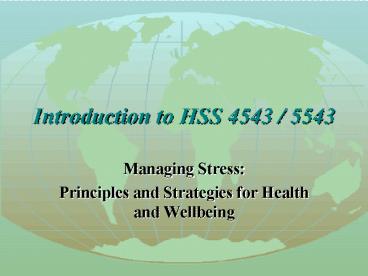Introduction to HSS 4543 5543 - PowerPoint PPT Presentation
1 / 21
Title:
Introduction to HSS 4543 5543
Description:
... 4543 / 5543. Managing Stress: Principles and Strategies for Health and Wellbeing ... Wellbeing. Emotional. Wellbeing. Spiritual. Wellbeing. HSS ... – PowerPoint PPT presentation
Number of Views:41
Avg rating:3.0/5.0
Title: Introduction to HSS 4543 5543
1
Introduction to HSS 4543 / 5543
- Managing Stress
- Principles and Strategies for Health and Wellbeing
2
Using a worldview and holistic approach...
Intellectual Wellbeing
Physical Wellbeing
Spiritual Wellbeing
Emotional Wellbeing
3
--Nature of Course--
- Need for taking personal responsibility (e.g.,
practice) - Opportunity for personal assessment
- Class activities that complement text
- Varied curricular approach
- Personal vs. professional perspective
4
--Nature of Instructor--
QR (Quieting Reflex) an example of a pause
technique
React-)
Activating Event
Pause
or
Dont React -)
React!!
5
--Nature of Classmates--
- How do you normally handle stress?
- How do you relax?
- How do you see yourself 10 years from now?
- Have you had a particularly stressful event occur
in your life? If so, describe it.
6
The previous exercise relates to this course in
the following ways...
- techniques that work!
- self evaluation / assessment
- use of imagery
- risk taking
7
Stress Audit Questionnaire (SAQ)
- Sources of stress
- Symptoms of stress
- physiological
- psychological
- Coping resources
8
Symptoms provide a stress signature
- Rigid responders similar responses over time
- Random responders different system responses
over time (often unpredictable) - General responders all system responses rise and
fall with level of sources
9
Definitions of Stress
- the confusion that is created when ones mind
attempts to override the bodys more basic desire
to choke someone who desperately needs to be
choked. (anonymous)
- the nonspecific response of the body to any
demand placed upon it to adapt, whether that
demand is related to positive or negative
consequences. (Hans Selye)
10
Types of Stress
- Eutress
-
- Neustress
- Distress
11
Stressors--the sources of stress
- Physical / Bioecological
- Cognitive / Psycho-intrapersonal
- Psychosocial
- Rapid Onset
12
(No Transcript)
13
Fight-or-Flight Response (Walter Cannon)
- Cardiovascular Changes
- ? heart rate, blood pressure, stroke volume
- ? blood coagulation, clotting
- vasoconstriction (skin, GI tract)
- vasodilation (skeletomuscular system)
- Respiratory Changes
- ? rate, depth, uptake of oxygen
- Gastrointestinal Changes
- ? stomach movement, peristalsis, blood flow
- ? glucose and free fatty acids
14
Fight-or-Flight Response (Walter Cannon)
- Other Changes
- Pupil Dilation
- Piloerection
- ? perspiration
15
The Stress Response(fight-or-flight)
- Arousal happens as a result of all stressors
(physical, mental, emotional, spiritual). - Arousal happens whether or not the threat is real
(e.g., car accident) or perceived (e.g., a noise
at night). - Arousal happens in proportion to the perceived
danger.
16
General Adaptation Syndrome - (Hans Selye)
- Alarm Reaction fight-or-flight response
- Resistance homeostasis
- Exhaustion malfunction of body part (possibly
terminal)
17
General Adaptation Syndrome(G.A.S.)
stressor
18
The Yerkes-Dodson Curve
19
The nature of stress is...
- Quantitative stress levels are produced by
stressors that lead to distress or eustress
(Cannon, Selye)
- Qualitative stress levels rely on attitudes
about stressors and, therefore, cognitive /
emotional appraisal (Richard Lazarus)
20
--Stress Cycle--
Self Talk
Poor Performance
Physiological and Mental / Emotional Stress
21
The repetition of this cycle often results in a
bad day!
Limit































